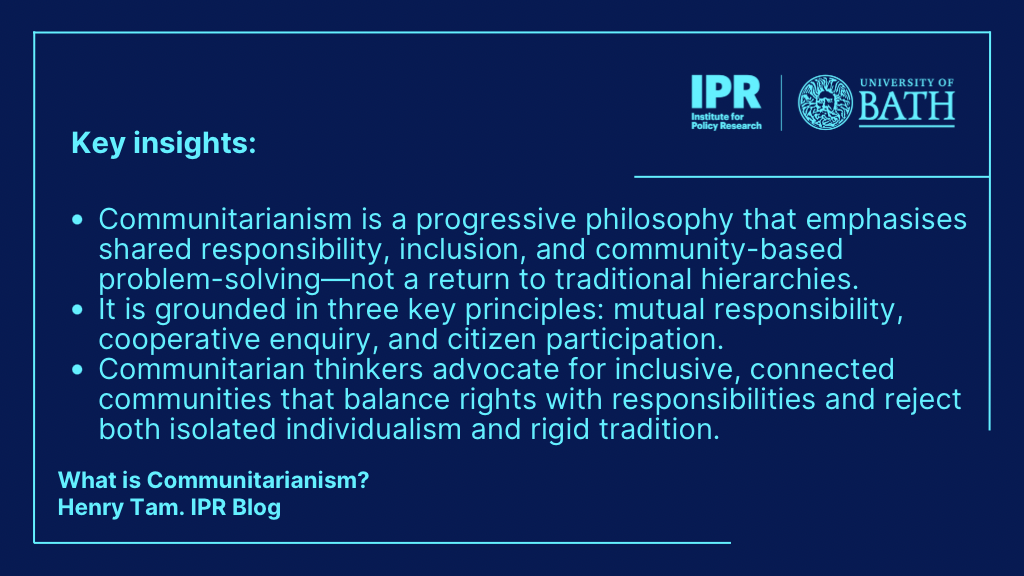 Discover how communitarianism offers a progressive path forward by focusing on shared responsibility, inclusive participation, and community-based solutions. In this blog, Henry Tam explores the roots and relevance of communitarian thought, clearing up common misconceptions and highlighting how its core principles can help build stronger, fairer societies in an age of global uncertainty.
Discover how communitarianism offers a progressive path forward by focusing on shared responsibility, inclusive participation, and community-based solutions. In this blog, Henry Tam explores the roots and relevance of communitarian thought, clearing up common misconceptions and highlighting how its core principles can help build stronger, fairer societies in an age of global uncertainty.
Henry Tam is a political theorist and former lecturer at the University of Cambridge. His books include The Evolution of Communitarian Ideas, Time to Save Democracy, and Tomorrow’s Communities: lessons in community-based transformation in the age of global crises. His exposition of communitarian ideas and their applications to contemporary political and public policy issues can be found in Communitarianism: politics, society & public policy, available from Bloomsbury here. For a free preview of the book’s introductory chapter, click here.
It is a curious fact that the term ‘communitarian’ gained prominence in the 1980s/1990s as a result of the works involving the notion of ‘community’ published by a number of progressive-minded thinkers, and yet it is still often used to describe reactionary preferences for old hierarchical communities. Some of this can be put down to many media commentators not bothering to read what those communitarians wrote. But even among academics there is a problem of interpretative pre-conception, which stems from the inaccurate yet common framing of communitarianism as being opposed to liberalism.
In order to understand communitarianism and its relevance to politics and public policy, we should focus on what makes it distinctive and how it can help us deal with societal problems differently. We can begin with the application of ‘communitarianism’ by many political theorists to the ideas of a number of their colleagues (Alasdair MacIntyre, Charles Taylor, Michael Walzer, and Michael Sandel) who criticised atomistic conceptions of morality and justice which suppose we can discover through conceptual reasoning what individuals should do in society, without reference to people’s experiences and relationships in actual communities.
These criticisms were not against the openness and diversity of liberal society, but against abstract individualism as a flawed basis for it. Its aim was to connect shared experiences, community learning, individual flourishing, with the socio-political pursuits of pluralism, inclusion and common wellbeing. In that respect, it echoes the ideas of early 20th century thinkers such as L. T. Hobhouse, John Dewey, Emile Durkheim, and Mary Parker Follett, whose advocacy for mutually supportive and collectively progressive community life anticipated what came to be known as communitarianism.
The task of developing ideas for institutional and policy changes to advance communitarian objectives were taken up by thinkers such as David Miller, Jonathan Boswell, David Marquand, and Henry Tam from the UK, and Philip Selznick, Amitai Etzioni, Robert Bellah, and Charles Derber from the US. They put forward a wide range of approaches to improve education, protection from harm, employment and the economy, business management, system of government, and the working of the voluntary and community sectors. Informing these approaches are three underlying principles derived through learning from community experiences:
-
The Principle of Mutual Responsibility
Promote mutual respect and support because communities where their members can interact without discrimination are more inventive, productive, and at ease in collaborating with others from inside or outside their own areas. By nurturing empathy and responsibility, communities become more adaptive to changes, capable of resolving differences peacefully, and less prone to being divided by irrelevant or trivial differences.
-
The Principle of Cooperative Enquiry
Support cooperative learning because communities where their members openly explore evidence, scrutinise arguments, and test hypotheses are more advanced in obtaining reliable information, and developing useful theories and practices. By displacing dogmas and fallacies through reasoned exchanges, communities become more adept at problem-solving and investigating the veracity of contested claims.
-
The Principle of Citizen Participation
Distribute power inclusively because communities where their members can influence decisions that affect their lives are more cohesive, stable, and disposed to take ownership of collective actions. By enabling meaningful participation at all levels, communities become more resilient, guided by shared concerns in shaping policies that require the pooling of their efforts and resources.
In light of these three principles, and their policy implications, we can perhaps clear up some persistent misconstruing of what communitarianism means.
Traditions & Hierarchies
Some commentators insist on associating communitarianism with nostalgic attachment to old traditions favouring oppressive hierarchies. But what communitarian thinkers emphasise is the evolving experiences of communities and how traditions should be preserved, revised, or ended, depending on their effects on people’s relationships and wellbeing. As for the much-quoted dichotomy of Gemeinschaft (tightly knit traditional community) or Gesellschaft (loose association of self-centred individuals), communitarianism rejects both and calls for strong cooperative communities based on mutual respect and shared intelligence.
Rights & Responsibilities
Communitarians are often alleged to have focused on the need for people to take responsibility for their own lives and neglected the importance of their rights. Based on their actual writings, it would be more accurate to say that they are concerned that people should take their social responsibilities seriously, especially those with considerable wealth and power as they ought to do more for their communities. At the same time, communities should ensure that appropriate rights to mutual respect and support are established for their members, and that these are honoured to avoid fragmentation and marginalisatiaon.
Open or Closed Community
Some politicians favour leaving communities to sort out their own problems regardless of whether or not they have the financial resources to do so, or if those problems are rooted in prejudices and malicious rumours. But for communitarian thinkers, no individual or community should be cut off from the outside world as though their fate is no one else’s business. Diverse individuals and communities form social connections, and it is their shared experiences – not some ideology about what governments should or should not do – that reveal what level of cooperation and wider support are appropriate to deal with the difficulties they face. In practice, cosmopolitan engagement is more dependable than parochial seclusion.
Reactionary or Progressive
Although some may still insist on calling any conservative writer who champions ‘traditional values’ or ‘small government’ a communitarian, the fact remains that all the established communitarians are on the progressive side of the political spectrum. Boswell and Bellah opposed ‘free market’ ideology and referred to their own position as ‘democratic communitarianism’. Selznick, Etzioni, and Putnam summed up their stance as ‘liberal communitarian’ to distance themselves from being mislabelled ‘conservative’. Miller and Derber stressed that what they advocated was best understood as a form of ‘left communitarianism’, while Marquand wrote of his ‘vision of a communitarian ethical socialism’.
At a time when some are lamenting the fact that old ‘isms’ are not adequate to help society move forward, and others are tempted to concede to whatever the most vocal crowds demand, we should revisit communitarianism as its core ideas were developed out of examining the weaknesses of previously dominant theories, and exploring how communities can learn from their experiences to improve themselves. Discarding misleading presumptions about communitarian thinking would be a good start to considering its potential contribution to building more inclusive and vibrant communities.
Henry Tam’s latest book Communitarianism: politics, society & public policy, be found available from Bloomsbury here. For a free preview of the book’s introductory chapter, click here.
All articles posted on this blog give the views of the author(s), and not the position of the IPR, nor of the University of Bath.
Responses





I'm surprised that apart from a passing reference to Alasdair MacIntye there is nothing here about Catholic Social Teaching as one of the origins of European communitarianism